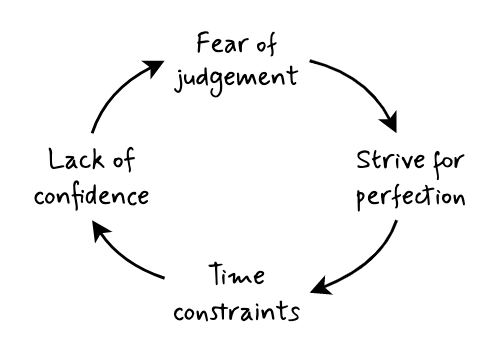Writing
- 4 minsOne of my goals in 2024 is to write regularly. Since “regularly” is highly subjective, I have been procrastinating to write since the last few months — maybe that should teach me a thing or two about setting clear goals! 🙂
This isn’t the first time I’m trying to form this writing habit. If you know me, you probably know my past failed attempts at kickstarting a web blogging habit.
Well, let’s face it: writing is hard; writing online, consistently, in public, is harder. There is a constant fear of judgment that causes you to strive for perfection. Achieving this perfection takes a lot of time, and without this time, you’d lack the confidence to publish your work because you fear judgment (back to where we started!). I call this the “cycle of doom” of writing.

This “cycle of doom” often causes a paralyzing hesitation that stifles creativity and productivity, making it difficult to write confidently. So, how do I plan to overcome this cycle of doom?
Defining the scope of my writing
The internet is a harsh, unforgiving place. There are tons of people who are way better than me in every aspect of whatever I do. Given this premiuse, it’s natural to fear judgment in anything that I intend to create (not just writing). One of my mental hacks to cope with this feeling is to have a target audience in my mind when I write something: I’m writing for those who might learn a thing or two from what I write; I’m not focused on people who already know-it-all — they probably don’t even bother reading what I write. To put that in different words: “My content is not for me; it’s for my past self” — these are the learnings from my experiences, the “aha!” moments from my experiments, lessons I learnt the hard way… basically, the things I would tell my younger self. Since there are possibly others in the same path or situation that I was in earlier, the goal of my writing is to make their journey a little bit easier.
While all this may seem obvious, such selective ignorance has helped me keep my writing focussed and overcome the fear of judgment or criticism. Not that I don’t care about judgment or criticism anymore, I just care a lot less now.
Biasing towards progress
Perfection is the enemy of progress. It took quite some time for me to realize that perfection is a fallacy — it’s a never ending utopian dream that always ends in disappointment. I will never be happy with what I write if I strive for perfection, because perfection isn’t absolute. The trick to break this rule: Aim for progress, not for perfection.
Progress creates momentum. It keeps the motivation going as I start seeing results with my writing week over week. My writing doesn’t have to be perfect to get going; it just has to be “good enough” and helpful.
At a glance this may seem like lowering the bar for myself by making peace with “good enough”, but remember that, with progress, what I perceive as “good enough” keeps increasing with time (practice) and consistency. True wisdom lies in realizing when it’s okay to not be perfect and get comfortable being imperfect.
Make no mistake: imperfect doesn’t mean incorrect or inaccurate. It’s just that my writing doesn’t require the same rigor as a PhD thesis.
Trusting myself
It’s hard to not second guess my thoughts when I’m writing. There is always a voice in my head asking: Am I really sure about what I’m writing? Am I the best person to be giving this advice? Do I know enough to form a strong opinion about this?
After talking to others, it’s comforting to know that this feeling is common — it’s the imposter syndrome playing with my mind. Believing that I am probably at least 50% better than what I think I am (even if that’s not true), gives me immense confidence to write.
On top of this, blindly assuming that I’m writing to a void and nobody is going to read it anyway makes my writing more genuine and honest.
A constant reminder that forces me to write often: I don’t have to be the best to write online — I just have to be better in some things in some ways than others.
With these three ways, I’m tricking my brain to form a writing habit. Will it succeed? Time will tell!
📬 Found this interesting? Boring? Send me an email with your thoughts!
